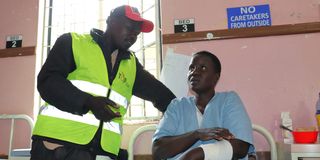Heroic act lands woman in hospital with deep baboon bites

Lilian Akinyi with her husband Cyril Obonyo during an interview on 25th September, 2024 at PGH following a baboon attack.
She sits up in her assigned bed as we walk through a long ward where she is with other women.
Lilian Akinyi is hopeful that once we air her plight, help will come her way.
Her left hand is swollen, from her elbow to her palm, and is wrapped around with a whitish gauze.
This is to cover up the deep lacerations left on her by a baboon that attacked her on September 9, 2024, when at work in Section 58.
She caresses her arm slowly to ease the pain she’s seemingly enduring as she narrates to us that this is not the first time it has happened, only that she was lucky then.
“I left home for work as usual, where I've been employed for the last three years. My job involves handling household chores and taking care of a child. On this particular day, after I finished the house chores, I took the dirty laundry to start washing. Suddenly, I heard banging on the roof. To my shock, within moments, nearly 20 baboons had entered the house and were approaching the child,” Akinyi says.
No sooner had she reached for the one-year-old baby than a male baboon attacked her and bit her lower forearm, she recalls.

Lilian Akinyi's hand remains swollen after a baboon attacked her two weeks ago in Section 58.
“When I tried running away again after having been bit, the baboon jumped on me again and bit my upper forearm, making me scream for help,” Akinyi recollects. My boss came and helped me by tying my hand to reduce the bleeding and immediately called an ambulance that brought me to the hospital where I was first given three shots of the tetanus injection and scheduled for my first surgery.”
Admitted at the Nakuru Level Five Referral and Teaching Hospital (PGH), for about two weeks now, she awaits her second surgery, which has been postponed to September 26, 2024, at 8 a.m.
Akinyi, the mother of five, is now seeking help from the government and well-wishers.
“I am in so much pain and can only wait for a sling to be able to support my hand. I have no way forward," she says. “Even after coming here, I am unsure of how I will be able to support my children as this accident has halted so many plans I had with my husband. I can only ask for help from well-wishers to support me and my family.”
This is not the first case in which Mtaa Wangu highlights the plight of human-wildlife conflict and more so by the same animal.
A year ago, we did a special report on ‘Visirani vya nyani’ that brought to light some of the challenges residents of Nakuru are facing with these animals.
The Kenya Wildlife Service maintains that baboons are part of the ecosystem, and nothing can be done to compensate the victims of this brutality, as baboons are not listed in the Wildlife Act among animals that attract compensation if they attack animals.
Catch our next read, where we speak to a medical expert on how exactly one is supposed to conduct themselves in case of a baboon attack and why a baboon bite can cause paralysis.

